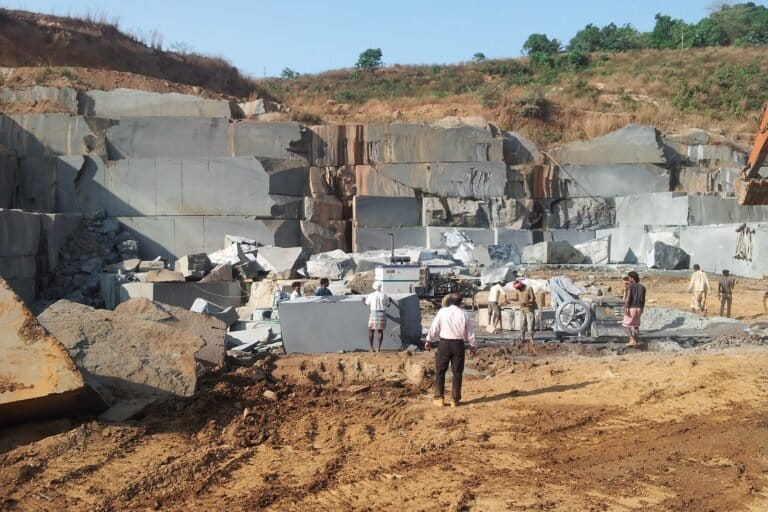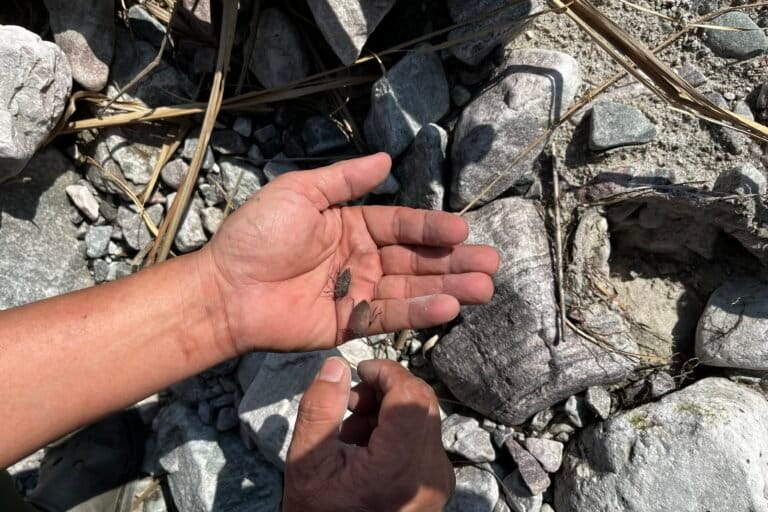- The detainment of environmentalist Sonam Wangchuk under anti-terror laws has drawn national condemnation, seen as part of a broader pattern of suppressing environmental activism and democratic dissent in India.
- Protestors in Ladakh are demanding constitutional rights and statehood to safeguard their land and natural resources.
- The movement took a violent turn for the first time on 24 September, when protestors burned down the BJP’s office and the police retaliated by opening fire.
Liaquat Ali, 27, never expected his hometown to descend into violence and turmoil over the span of a year.
Last year, Ali was one of dozens who walked over 800 kilometres on foot from Ladakh to New Delhi to bring greater attention to demands for statehood and other constitutional safeguards in Ladakh. The peace march was led by environmentalist and scientist Sonam Wangchuk – a vocal advocate for the application of the sixth schedule in Ladakh, which empowers majority tribal constituencies to formulate their own laws on land use, customs, and development. Ending the march on Mahatma Gandhi’s birth anniversary was a deliberate choice.
Today, Wangchuk is jailed under one of India’s most stringent anti-terror laws after a hunger strike he led turned violent, and the license to receive foreign funding to his organisation was abruptly cancelled shortly thereafter. Wangchuk had acted in ways that were “prejudicial to the State and detrimental to the maintenance of peace,” the Ladakh administration alleged in a press release. Police opened fire and killed four protestors after a group of unidentified people set the BJP’s office in Leh ablaze on September 24. Wangchuk called off his strike and appealed for peace.
“It’s depressing to think that this is what it’s come to,” said Ali, speaking to Mongabay India from Kargil district. “Yes, some protestors acted out of frustration, but the police’s response was inhumane,” he said. The incident on September 24 is the first violent turn the years-long protests for statehood have taken in Ladakh.
Wangchuk’s detainment and police firing have drawn widespread condemnation from activists across the country. Wangchuk was awarded the Ramon Magsaysay in 2018 for his dedication to community led education and innovation. “His arrest is a clear signal that no matter what you’ve done or how credible you are, if you ask for a political right or question the government, you can be targeted,” said Manshi Asher, co-founder of the Himdhara collective, which supports people’s movements in the Himalaya.
Read more: [Explainer] What is the Sixth Schedule? Why is Ladakh demanding to be brought under it?
Prolonged negotiations
At the heart of the demand for statehood and sixth schedule status is a desire to regain control over decision-making when it comes to the region’s natural resources. Since becoming a union territory in 2019, Ladakh has been under the administrative control of the central government, spurring concerns about unchecked development and environmental degradation.

Ladakh’s Autonomous Hill Councils have powers to manage infrastructure and plan certain development activities, but are not empowered to enact laws or establish courts. Statehood and sixth schedule status would accord the Ladakhi people rights to self-governance over land, forests, cultural customs, and inheritance.
In 2023, the central government formed a High Powered Committee (HPC) and agreed to negotiate with leaders from Ladakh on several issues, including the possibility of providing constitutional safeguards to the region. Apart from sixth schedule status and statehood, other demands by representatives of the union territory included separate seats in Parliament for Leh and Kargil (the two districts making up Ladakh) and providing government employment.
Days after the latest protests turned violent, the Ministry of Home Affairs – under whom the HPC was formed – put out a statement saying “the dialogue mechanism… has yielded good results.” The Ministry cited increased reservations for Scheduled Tribes, more reservations for women in the Autonomous Hill Development Councils, and protection of local languages as achievements of the negotiation process. “The process of recruitment for 1800 posts in government has already commenced in UT of Ladakh. We are confident that continuous dialogue would yield the desired results in the near future,” the Ministry added.
But negotiations have been slow moving on the two biggest demands of the protests – statehood and sixth schedule. “This issue will not go away till our demands are fulfilled,” Thupstan Chhewang, chairman of the Leh Apex Body (LAB), told the press. The LAB is one of two organisations representing Ladakh’s interests in the negotiations. “Had the government agreed to talks in a timely manner, this tragedy would never have occurred,” he added. The government fixed the next round of talks on October 6, despite calls for a meeting to happen sooner.
Both the Leh Apex Body and Kargil Development Association have called off further talks till normalcy returns, Wangchuk is released, and a judicial inquiry is called into why the police escalated matters by opening fire. A magisterial inquiry into the shooting was ordered on October 2.
Decentralising power over land
Currently, sixth schedule status only applies to some regions in northeast India under the constitution. Including Ladakh in the sixth schedule would require a constitutional amendment, explained Harihar Bhattarcharaya, a professor of Political Science at the University of Burdwan. “The demand is legitimate, because the region fulfills the requirements of the sixth schedule, but it requires major constitutional reform,” he said. “Perhaps the government is hesitating because it will open a Pandora’s box of demands from other places where it should be applicable too.”
Over 90% of Ladakh’s population is tribal, making it a compelling case for consideration under the sixth schedule, said Bhhatarcharaya. Ladakh’s high-altitude cold desert ecosystem also makes it home to several unique flora and fauna that have been maintained by pastoralist tribes like the Changpas.

The central government is keen to draw industrial investments to this landscape. A land allotment policy for industry was notified in February this year, after it was amended to more explicitly include the role of Ladakh’s Autonomous Councils in decisions to allot land. A key reason for intensifying protests is to have more control over legislations concerning land use. Vast tracts of land have been leased out for solar power projects, reportedly without public consultations.
“The risk is that without constitutional protections, resource extraction will happen in a way and at a pace that will jeopardize local livelihoods. For three consecutive years, this trans-Himalayan region has seen higher precipitation instead of snow, which can cause flash floods and other hazards. Dealing with this needs good, deliberative governance,” said Asher of Himdhara.
Environmentalists targeted
The district administration, including the director general of police, have alluded to Wangchuk’s involvement in an international criminal conspiracy to cause disharmony in India – a claim many have called baffling. “There isn’t a shred of evidence to show that Sonam Wangchuk incited violence, which is why the government is weaving narratives of a grand conspiracy. They’ve detained him under a law that doesn’t require any evidence,” said political commentator Yogendra Yadav.
Wangchuk was detained under the National Security Act and transferred to Jodhpur central jail on 26 September. Gitanjali Angmo, Wangchuk’s wife, said she had neither heard from her husband since his detainment nor been explained her own rights.
“Is it a crime to speak about climate change, melting glaciers, educational reforms and grassroot innovation? To raise one’s voice for upliftment of a backward tribal belt which is ecologically fragile in a peaceful Gandhian manner for the last four years? It certainly cannot be termed as a threat to national security,” she wrote in a letter to the Prime Minister and President on October 1.
Several environmental organisations, movements, and activists in India have weathered similar accusations of international criminal conspiracy. In 2021, climate activist Disha Ravi was arrested by the Delhi Police for sharing a social justice toolkit in support of the farmer’s protests, which the police alleged was evidence of her intention to “wage economic, social, cultural and regional war against India”. A judge later called the prosecution’s evidence scanty when granting her bail. Last year, rights to receive foreign funding for several organisations working on environmental issues were suspended, often citing undue foreign influence over Indian policy.
“We’re literate, educated people asking for our democratic rights, but we’re jailed and called anti-national instead,” said Ali. “Sonam Wangchuk must be released. We want things to return to normal in Ladakh.”
Banner image: Sonam Wangchuk addresses a gathering at a protest demanding statehood and other democratic rights for Ladakh in New Delhi on February 15, 2023. (AP Photo/Altaf Qadri)














